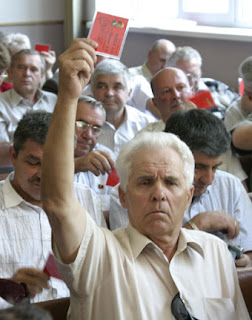Vladimir Putin has once again angered Ukrainians, but this time around it’s not only the nationalists and euroatlantacists who’re upset.
The cocksure future president of Russia managed to rattle Ukraine’s communists and war veterans on Dec. 16 when he claimed that Russia didn’t need Ukraine’s help to win WW2.
Ukraine’s communists and war veterans – usually diehard proponents of closer ties (and in some cases union) with Russia –expressed indignation at Putin’s words as politicians called for Ukraine’s foreign ministry to respond to the Russian leader’s outrageous statement.
The Ukrainians have the leader of a Russian bike club to thank for exposing what Putin really thinks about Ukraine’s formidable contribution to the defeat of Nazi Germany and the Axis forces in the “The Great Patriotic War.”
Alexander Zaldostanov, president of the Night Wolves Motorcycle Club was in the audience for the live, televised Q+A session with Putin last Thursday, when the microphone lady gave him a chance to ask the Russian leader a question.
Zaldostanov and Putin had met before and rode their Harleys together in Crimea during the summer before last when Putin traveled to Sevastopol for one of his macho PR stunts. (And to gloat over Ukraine’s extension of the Russian Black Sea Fleet’s lease in that port city.)
Speaking from the studio audience last Thursday, the leather-clad, bearded leader of the Night Wolves’ pack known by his handle “Khirurg” (Surgeon) reminded Putin of the rally of 5,000 bikers in the preface to his question that saw Putin put a foot in his mouth in a way that no spin doctors could help get out.
Sporting tattoos and a thick gold chain around his neck, Zaldostanov reminded Putin that the bike rally in Crimea was dedicated to the “65th anniversary of Victory” and “the idea that we probably would not have won the war if we [Russia and Ukraine] were separate states.”
Khirurg proceeded to paraphrase Putin, claiming the Russian leader once lamented “he who doesn’t want Ukraine and Russia to be together doesn’t have a heart but he who wants Ukraine and Russia together doesn’t have a mind.”
Speaking straight from his own heart and with hope in his eyes, Zaldostanov asked “Would you agree that the heart can sometimes replace the mind but that the mind can never replace the heart?”
“Sash,” Putin said, speaking to the biker like to a good buddy, “that’s a very deep question, one that I’m not sure I understand.”
First, Putin clarified the quote Zaldostanov attributed to him.
“I was talking about the demise of the Soviet Union... He who isn’t sorry that the Soviet Union fell apart has no heart, but he who wants to recreate the USSR, as it was, has no head.”
“Concerning our relations with Ukraine... I will allow myself to disagree with you when you say 'if we were divided, then we wouldn’t have won the war.'”
“We would have won either way,” Putin said in a lecturing tone.
Awkward pause. Scattered applause.
“That’s because we’re a country of winners,” Putin said in a victorious tone as the clapping continued.
He proceeded to back up his claim with “facts” such as 70 percent of the losses suffered by the Soviet Union were incurred by the Russian Soviet Federated Socialist Republic.
“That war was won – I do not want to offend anyone – but primarily on account of the resources, human and industrial resources of the Russian Federation. That’s a historical fact, it’s all in the documents,” Putin said.
The communists and war veterans of Ukraine reacted to the news of Putin’s statements with disbelief and indignation. But some, displaying the slave mentality that has been instilled in them by centuries of imperial domination, tried to make apologies for their masters in Moscow explaining Putin’s statements away as a mistake made in haste ahead of the 2012 presidential elections in Russia.
Communist MP Oleksandr Holub called Putin’s statement “very controversial” but speculated that the Russian may have uttered it “without appropriate preparation.” He said that “Putin’s concept helps the cause of Ukrainian nationalists who assert that Red Army soldier ‘fought for a foreign country.’”
“Germany waged war with the Soviet Union, not with Russia, Ukraine or other republics,” said Yuli Korotkin, chairman of the Committee of War Veterans. “I consider such thoughts and answers to be primitive. To divide our victory like a pie is sacrilege! It’s desecration of the memory of 27 million Soviet people who died in the GPW and 1.9 million veterans still alive from the Great Patriotic.”
A spokesman for Ukraine’s Foreign Ministry said it will not officially react to Putin’s words, adding that Ukraine’s position is that all the peoples of the former USSR can consider themselves winners of the Great Patriotic War.
At least Ukrainians now have further proof of what Putin, the man likely to be Russia’s next president, really thinks about their country(in addition to his claim that Ukraine “is not really a country.”) And we have the straight-shooting bikers of MC Night Wolves to thank for it.














